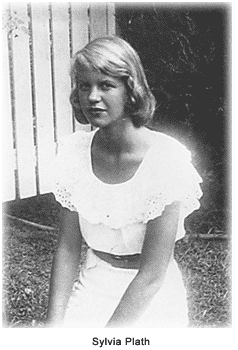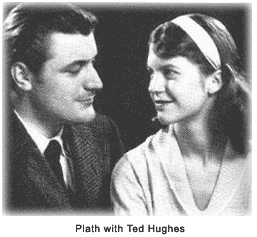Sylvia Plath was an American poet, short-story writer, and novelist. In her short life, Plath achieved iconic status as one of the best poets of her era. She also is known for her semi-autobiographical novel The Bell Jar, which details her struggle with depression.
 Early years
Sylvia Plath was born on October 27, 1932, in Jamaica Plain, Massachusetts, to middle-class parents. She published her first poem at the age of eight. Her father died around the same time; she never fully recovered from the shock of losing him.
Sylvia attended Wellesley High School, and was a straight-'A' student. She continued to write poems and short stories, and had achieved modest success by the time she entered Smith College on a scholarship in 1950.
Early years
Sylvia Plath was born on October 27, 1932, in Jamaica Plain, Massachusetts, to middle-class parents. She published her first poem at the age of eight. Her father died around the same time; she never fully recovered from the shock of losing him.
Sylvia attended Wellesley High School, and was a straight-'A' student. She continued to write poems and short stories, and had achieved modest success by the time she entered Smith College on a scholarship in 1950.
 A danger signal
In 1953, Sylvia Plath attempted suicide with sleeping pills after her junior year at college. She was committed to a mental institution and appeared to make a good recovery. While attending Smith, Plath wrote more than 400 poems. In 1955, she graduated from Smith College summa cum laude. The same year, Plath won the Glascock Prize for her poem, Two Lovers and a Beachcomber by the Real Sea.
Plath earned a Fullbright Scholarship to the University of Cambridge in England, where she continued to write, and publish some of her work in the student newspaper, Varsity. While Plath was at Cambridge, she met the English poet, Ted Hughes. They were married in June 1956.
Great promise
After Plath received her master of arts degree from Cambridge, they moved back to Massachusetts, where she taught at Smith College from 1957 to 1959. The couple then moved to Boston, Massachusetts, where Plath attended seminars with poet Robert Lowell. That experience would influence her work. When the couple discovered that she was expecting, they moved back to the United Kingdom.
The couple settled in Court Green, North Tawton, a small market town in Mid Devonshire. It was there that Plath published her first collection of poetry, The Colossus, in 1960. Following the births of two children, the marriage met with difficulties, and they separated in 1962. Their separation was mainly attributable to her mental illness and Ted's infidelities. The couple did not divorce.
A wintry end
With the worst winter on record and the struggles Plath endured trying to support two small children, her depression returned worse than ever. She committed suicide in February 1963, just two weeks after The Bell Jar’s publication.
Sylvia Plath's remains are buried in the churchyard at Heptonstall, West Yorkshire.
Two years after Plath's death, Ariel, a collection of some of her last poems, was published. That was followed by Crossing the Water and Winter Trees in 1971. In 1981, The Collected Poems, edited by Ted Hughes, was released, which made Sylvia Plath the first poet to win a posthumous Pulitzer Prize.
A danger signal
In 1953, Sylvia Plath attempted suicide with sleeping pills after her junior year at college. She was committed to a mental institution and appeared to make a good recovery. While attending Smith, Plath wrote more than 400 poems. In 1955, she graduated from Smith College summa cum laude. The same year, Plath won the Glascock Prize for her poem, Two Lovers and a Beachcomber by the Real Sea.
Plath earned a Fullbright Scholarship to the University of Cambridge in England, where she continued to write, and publish some of her work in the student newspaper, Varsity. While Plath was at Cambridge, she met the English poet, Ted Hughes. They were married in June 1956.
Great promise
After Plath received her master of arts degree from Cambridge, they moved back to Massachusetts, where she taught at Smith College from 1957 to 1959. The couple then moved to Boston, Massachusetts, where Plath attended seminars with poet Robert Lowell. That experience would influence her work. When the couple discovered that she was expecting, they moved back to the United Kingdom.
The couple settled in Court Green, North Tawton, a small market town in Mid Devonshire. It was there that Plath published her first collection of poetry, The Colossus, in 1960. Following the births of two children, the marriage met with difficulties, and they separated in 1962. Their separation was mainly attributable to her mental illness and Ted's infidelities. The couple did not divorce.
A wintry end
With the worst winter on record and the struggles Plath endured trying to support two small children, her depression returned worse than ever. She committed suicide in February 1963, just two weeks after The Bell Jar’s publication.
Sylvia Plath's remains are buried in the churchyard at Heptonstall, West Yorkshire.
Two years after Plath's death, Ariel, a collection of some of her last poems, was published. That was followed by Crossing the Water and Winter Trees in 1971. In 1981, The Collected Poems, edited by Ted Hughes, was released, which made Sylvia Plath the first poet to win a posthumous Pulitzer Prize.